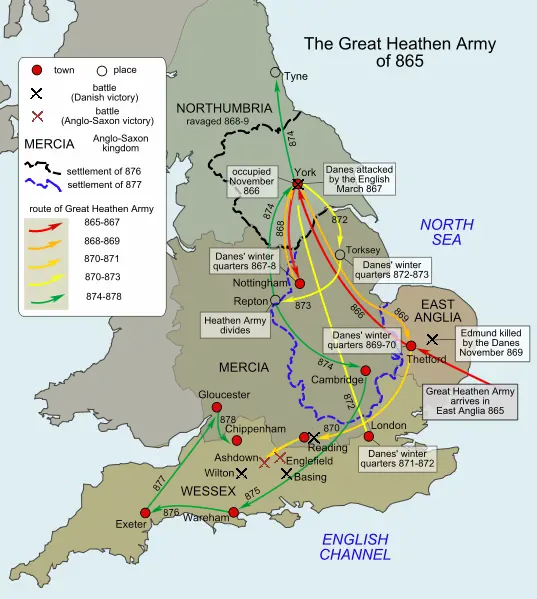|
Alfred the Great Part 2: Subject of a Great Many StoriesAlfred the Great, as he went on to become known, is the subject of many stories. One of them is that on the eve of the Battle of Ashdown, Alfred disguised himself as a wandering minstrel and wandered into the Danish camp, to assess the size and preparation of the force. Another story about Alfred and this battle is that in order to bolster the reinforcements of Æthelred's main force, Arthur went up onto a nearby hill and directed a fierce burst of air threw a special stone called the "Blowing Stone." The result was a booming alarm sound, which men from miles around heeded by taking up their arms and joining the king. Many of the stories about Alfred come down to modern readers through the Anglo-Saxon Chronicle, which Alfred commissioned, and through a biography of Alfred written by Asser, a 10th-Century Welsh scholar. One story from Asser's work of Alfred's youth is that Alfred's mother, Osburh, offered a book of Saxon poems to the first of her six children who could memorize the entire book and that Alfred, the youngest, won the prize. Alfred is thought by many historians to have been more interested in intellectual pursuits and to have faced health challenges from early in his life. Circumstances worked against any preference he might have had for a scholarly pursuit, however, and Alfred is now remembered in large part as a military commander and a uniter of people.
Alfred's success at Ashdown did not immediately turn the tide. In fact, the tide didn't turn at all for many years. Just three months after Ashdown, Æthelred died and Alfred was crowned king. A fierce defeat at Wilton in May forced Alfred to sue for peace, and the Danes agreed. Alfred had a brief bit of success in 878, although that followed an inventive bit of Danish strategy that saw a main force under the leader Guthrum sneak past the main English force in Wessex and raid Dorset and Devon, in the southwest. Alfred pursued, using a part of his newly commissioned navy, and forced the Danes to retreat back to Mercia. As after Ashdown, the English gained no relief or reversal of fortune. In fact, things got worse. In January 878, a surprise Danish attack drove Alfred out of the royal stronghold at Chippenham and devastated the Saxon force. Alfred and a tiny band of followers survived by melting into the swampland of the Somerset Levels. Alfred was able to mount a resistance movement with headquarters at a fort at Athelney, an island in the marshes. The local forces from Hampshire and Wiltshire, together with the Somerset force, stayed true to their king and his cause. Part 3: Always Learning |
|
Social Studies for Kids
copyright 2002–2024
David White

 When he was 19, he joined his father, Æthelred, in an attempt to keep the Great Heathen Army of the Danes out of neighboring Mercia. That effort failed, and Wessex became increasingly isolated. By 870, Wessex stood alone.
When he was 19, he joined his father, Æthelred, in an attempt to keep the Great Heathen Army of the Danes out of neighboring Mercia. That effort failed, and Wessex became increasingly isolated. By 870, Wessex stood alone.
